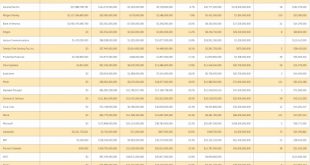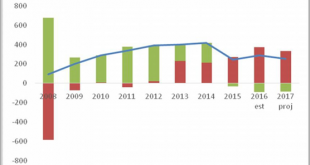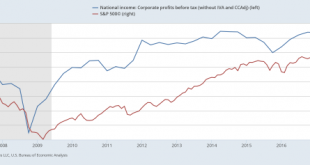from Dean Baker There has been a strange debate among many liberals and progressives since the election as to whether they should have empathy for the people who voted for Donald Trump. After all, Trump is a pretty reprehensible character who has pledged to do some pretty awful things in the White House. Is there a reason that people should have empathy for the voters who put him there? Whatever answer you pick to that question, there is another set of questions that should be simpler for...
Read More »Hiding the surplus
from David Ruccio Most of us pay the taxes we’re required to pay. That’s because there aren’t many ways to avoid them. Sales, property, payroll, or income—the tax is paid at the time of the purchase, the amount is deducted from our paychecks, or the records go directly to the government. There’s no real way around them. And we pay those taxes out of wages and salaries more or less willingly, since that’s how government services are financed. Not so for those who are able to capture the...
Read More »Economics textbooks transmogrifying truth — growth theory
from Lars Syll [embedded content] The above vidoe is one in a series of videos where Alex Tabarrok and Tyler Cowen present their economics textbook Principles of Economics. In a later video, ‘ideas’ are introduced into the Solow growth model. But, not with a single word does one acknowledge that this in total contradiction to the Holy Grail of their mainstream economics — the “iron logic of diminishing returns.” In Paul Romer’s Endogenous Technological Change (1990) knowledge is made the...
Read More »The monetary and fiscal design of the Eurozone. New ideas and old mistakes from the EC.
Recently the European Commission (EC) has published a “A possible roadmap towards the completion of the Economic and Monetary Union by 2025”. It is an important report. According to the report once Britain will have left the EU 85% of EU inhabitants will use the Euro. The future of these people is at stake. The report proposes: to introduce at least a bit of Eurozone level fiscal policy to introduce a kind of Eurobonds to introduce a system of unemployment insurance which, during...
Read More »Where will global demand come from? (4 charts)
from C.P. Chandrasekhar and Jayati Ghosh For several decades, the US economy functioned as the principal agent of global demand, sucking in vast amounts of imports from the rest of the world as it built up vast current account deficits. Of course, it was easily able to finance these deficits with capital inflows, benefiting from its status as the holder of the only viable global reserve currency. But just as the US was able to make the rest of the world in effect pay for its own domestic...
Read More »What is Post Keynesian Economics?
from Lars Syll John Maynard Keynes’s 1936 book The General Theory of Employment, Interest, and Money attempted to overthrow classical theory and revolutionize how economists think about the economy. Economists who build upon Keynes’s General Theory to analyze the economic problems of the twenty-first-century global economy are called Post Keynesians. Keynes’s “principle of effective demand” (1936, chap. 2) declared that the axioms underlying classical theory were not applicable to a...
Read More »Intellectual property is real money
from Dean Baker In the last four decades, US policymakers have taken major steps to strengthen and lengthen patents, copyrights, and other forms of intellectual property (IP). The normal duration of patents and copyrights have been extended, and patents have been expanded to cover life forms, software, and business methods. This strengthened IP regime has been supported by both political parties and has gone largely unquestioned in public debate. That’s unfortunate, because there is an...
Read More »Bottom line
from David Ruccio The business press is having a hard time figuring out this one: the combination of unrelenting drama in and around Donald Trump’s White House and the stability (signaled by the very low volatility) on Wall Street. As CNN-Money notes, One of the oldest sayings on Wall Street is that investors hate uncertainty. But that adage, much like other conventional wisdom, is being challenged during the Trump era. Despite enormous question marks swirling around the fate of President...
Read More »Chicago economics — a dangerous pseudo-scientific zombie
from Lars Syll Every dollar of increased government spending must correspond to one less dollar of private spending. Jobs created by stimulus spending are offset by jobs lost from the decline in private spending. We can build roads instead of factories, but fiscal stimulus can’t help us to build more of both. This form of “crowding out” is just accounting, and doesn’t rest on any perceptions or behavioral assumptions. John Cochrane What Cochrane is reiterating here is nothing but Say’s...
Read More »Europe’s third alternative: leapfrogging Putin
from Robert Locke One big problem in orthodox economics is the inability of its market orientation to cope with strategic implications of economic and political geography. I pointed that out in an article published in the rwer (“Reassessing the basis of economics: from Adam Smith to Carl von Clausewitz,” #61, 26.09.2012, 100-114), to which nobody responded. But the issue won’t go away and is especially pertinent today, because of the uproar caused by Trump’s failure to support the...
Read More » Real-World Economics Review
Real-World Economics Review







